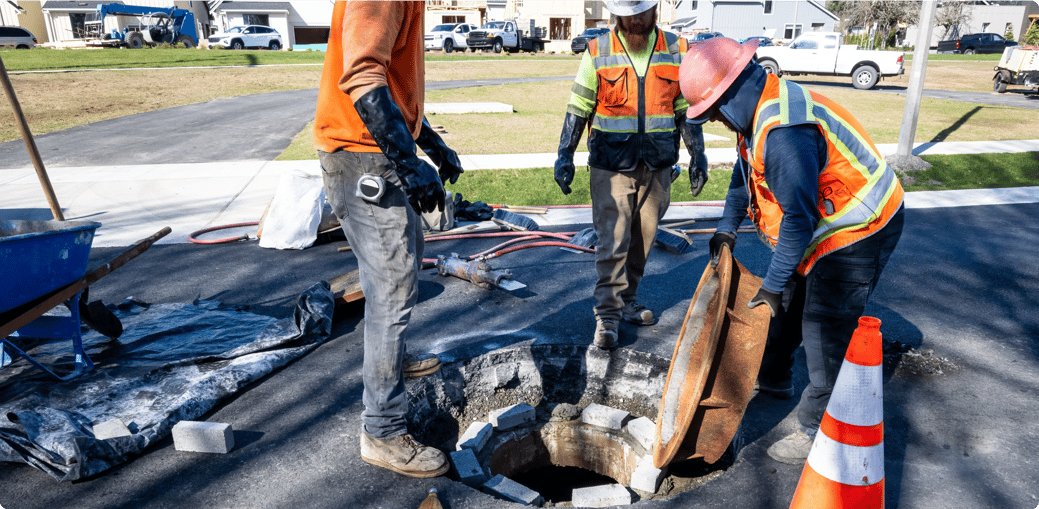Top 5 Mistakes Sewer Field Workers Make (According To The Pros)
As a sewer inspection field worker, you play a crucial role in maintaining public health standards by ensuring our sewage systems operate efficiently. Despite your expertise and dedication, even the most seasoned sewer workers can make mistakes. In this blog, we'll explore common errors and provide actionable advice on how to avoid them. Insights from seasoned field operators will guide both new and veteran workers toward excellence in their roles.

Mistake #1: Ignoring Safety Protocols
The Hazard of Complacency
One of the most prevalent mistakes made by sewer workers is neglecting strict safety protocols. The underground and confined environments of sewer systems are fraught with hazards: toxic gasses, pathogenic microbes, and physical risks from aging infrastructure.
Adam Burns, former operator and Digital Systems Support Consultant at Ramboll Water Operations, stresses the importance of having a contingency plan in place:
“As you pass each piece of equipment, ask yourself what you would do if it suddenly failed. Ideally, you want to have a written plan of action to deal with these types of failures, to include rental equipment company contacts, cost and delivery time estimates, and basic procedures to follow in the event of a crisis.”
 Check out our last post, Staying Up On Safety Underground, for an in-depth guide to safety certifications and regulations.
Check out our last post, Staying Up On Safety Underground, for an in-depth guide to safety certifications and regulations.
Mistake #2: Poor Maintenance of Equipment
Cost of Cutting Corners
Neglecting regular maintenance of sewer equipment not only shortens the lifespan of the tools but also increases the risk of accidents. Faulty equipment can lead to incomplete or inefficient cleaning and repairs, compounding problems within the sewer system.
In his tips to field workers, Adam explains the role that preventive maintenance plays:
“Running equipment until it fails is never cost-effective, and major equipment failures often lead to stressful crisis management situations. Maintain your equipment according to the manufacturer’s recommendations and address minor corrective maintenance items early to prevent major failures.”
.png?width=850&height=272&name=Frame%205405%20(1).png)
.png?width=850&height=530&name=Ad%20Image%207%20(1).png)
Mistake #3: Inadequate Documentation
The Pitfalls of Poor Paperwork
Inadequate documentation is a common oversight that can lead to repeated mistakes and regulatory issues. Detailed records are crucial for accountability and continuity in maintenance programs.
Adam Burns advocates for the use of data management software to prevent human error:
“Sometimes the first indication that you’re headed for trouble comes from the numbers you get. Watch the data closely and look for trends. Data management software can be extremely useful here.”
Mistake #4: Underestimating the Importance of Communication
The Communication Gap
A lack of clear communication among team members and with management can lead to inefficiencies and errors in sewer operations. Proper communication ensures that everyone is on the same page and can respond effectively to any situation.
Envirosight cites the importance of effective communication and how modern municipalities are achieving it:
“If inspection data can immediately be transferred from the field to clients and coding teams, everyone can turn work around faster. More and more municipalities are finding that technology can help them share and communicate better, and thus accelerate inspection workflows substantially. Most significantly, software that is tailor-made for the wastewater industry.”
Mistake #5: Not Embracing New Technologies
Sticking To Old Ways
Failing to stay updated with new tools and technologies can significantly hamper your efficiency and effectiveness. Those who cling to outdated methods may find themselves falling behind, not only in maintaining the system but in ensuring their own safety and that of their environment.
Adam encourages field workers to never stop learning in their role and stay open-minded to superior solutions that may exist:
“There are always new products and new technologies being released. Read about these new ideas and talk to operators at other sites to learn about how they work (or why they don’t work). You never know when you might find a superior solution that will help your plant run better.”
Featured Industry Innovation
SewerAI’s AutoCode can identify and predict sewer system issues before they become critical, allowing for proactive maintenance rather than reactive measures.
 Learn more about SewerAI.
Learn more about SewerAI.
Safeguard Against Common Mistakes
Avoiding these common mistakes requires vigilance, commitment, and continuous education. By putting these recommendations into action, you can promote a smoother operation. Remember, excellence in sewer operation isn't just about avoiding errors; it's about striving for continuous improvement and safety at every turn.
To safeguard against these common mistakes, SewerAI is here to automate tedious manual processes. Get in touch to learn more.
References
Symonds, Allison. “How Sewer Operators Can Improve Productivity through Communication.” Innovations in Pipe Inspection Technology, Envirosight, blog.envirosight.com/how-sewer-operators-can-improve-productivity-through-communication.
“The Top Five Tips for Wastewater Operators to Keep on Top of Their Plants.” Opseyes, opseyes.com/top-five-tips-for-wastewater-operators-to-keep-on-top-of-their-plants/.

.png?width=850&height=416&name=Ad%20Image%206%20(1).png)
.png?width=850&height=272&name=Frame%205405%20(2).png)

.png?width=850&height=272&name=Frame%205405%20(3).png)
